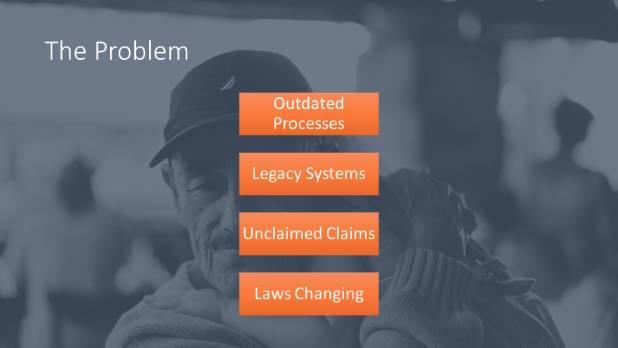 Outdated Processes: The life insurance industry is a 258-year-old industry, and, though claims may make it in the top 10 list of issues for the CIO, the focus for the company as a whole tends to be on generating revenue. The claims staff works overtime to come up with various duct-tape systems filled with Excel spreadsheets, Access databases or various systems to balance the needs of regulators, old processes (this is how we have always done things) and beneficiaries. Beneficiaries wind up supplying the same information in multiple documents, sending the same documentation multiple times and chasing down faxes/mails for next steps.
See also: How IOT Will Change Claims Process
Legacy Systems: On average, the claims staff touches four to 10 systems to process one claim. The claims module is most likely attached to policy administration systems in which modules don’t get updated often. To innovate claims processes gives CIOs headaches because they have to rip apart the monolithic and old systems that run the entire business. The mentality – “If it ain’t broke, don’t fix it” -- creeps in.
Unclaimed Claims: There is more than $14 billion of unclaimed life insurance policies, and the number keeps growing $1 billion a year. Why is that? Ask yourself one simple question: How many times have you been asked to update your beneficiaries? Ask yourself another simple question: Have you informed your beneficiaries about policies you have for them? One of our co-founders could have been another drop in the bucket for unclaimed claims. He was at his father’s funeral, and one of his father’s co-workers came to give Jason his condolences. The co-worker said, “If you need help with paperwork, please let me know.” Jason said, “What paperwork?” He learned that his dad had a life insurance policy.
Laws Changing: Each state and country has its own governing laws that need to be abided with when processing claims. One state may require a death certificate while another state may ask for additional documentation.
How might claims departments innovate in the face of outdated processes, legacy systems, data that needs clean-up and changing regulation?
There are three key recommendations:
Keep Learning – Insurtech is HOT! Books are being written, conferences are popping up and fresh faces (like me) are appearing. Keep reading, attending and talking to learn what is happening in the space and how to navigate change.
Keep Seeking – Insurtech is HOT! Which means, there are startups that are popping up to help solve complex problems. Benekiva is my startup with three other founders, and we are on a mission to help bridge the gap between life insurance companies and the intended beneficiaries, through beneficiary management and claims automation. What is cool about us – we can work with legacy systems, so you don’t have to pour millions into the work. There are other insurtech startups that are solving other pain points. What’s great about startups – they are small, nimble and hungry, which equates to: They will do whatever you need them to do…to a certain extent. Partnering with startups can leapfrog your innovation efforts and their startup mentality may rub-off on your staff.
Keep Trying – You eat an elephant one bite at a time. I see claims processes as a big elephant, and the only way to improve is by “bitsizing.” What is one area of claims that can be improved? Identify that and try to find or partner up on a solution. Remember: Insurtech is HOT! I’ve seen organizations want to tackle the “elephant,” and unfortunately, those projects can take two years and longer and your strong talent is burned out at the end. What you get at the end is an “old” system – two years is a long time in tech.
See also: Making Life Insurance Personal
To innovate in claims, the C-suite needs to make claims a priority and see it as a customer-experience issue.
My five-year vision is to have the following experience when giving presentations about Benekiva:
“Bobbie, I just submitted a claim, and I instantly received notification that money is available in the account. I also received a text message from an adviser whom my dad was using and who is going to help me plan for my future.”
Outdated Processes: The life insurance industry is a 258-year-old industry, and, though claims may make it in the top 10 list of issues for the CIO, the focus for the company as a whole tends to be on generating revenue. The claims staff works overtime to come up with various duct-tape systems filled with Excel spreadsheets, Access databases or various systems to balance the needs of regulators, old processes (this is how we have always done things) and beneficiaries. Beneficiaries wind up supplying the same information in multiple documents, sending the same documentation multiple times and chasing down faxes/mails for next steps.
See also: How IOT Will Change Claims Process
Legacy Systems: On average, the claims staff touches four to 10 systems to process one claim. The claims module is most likely attached to policy administration systems in which modules don’t get updated often. To innovate claims processes gives CIOs headaches because they have to rip apart the monolithic and old systems that run the entire business. The mentality – “If it ain’t broke, don’t fix it” -- creeps in.
Unclaimed Claims: There is more than $14 billion of unclaimed life insurance policies, and the number keeps growing $1 billion a year. Why is that? Ask yourself one simple question: How many times have you been asked to update your beneficiaries? Ask yourself another simple question: Have you informed your beneficiaries about policies you have for them? One of our co-founders could have been another drop in the bucket for unclaimed claims. He was at his father’s funeral, and one of his father’s co-workers came to give Jason his condolences. The co-worker said, “If you need help with paperwork, please let me know.” Jason said, “What paperwork?” He learned that his dad had a life insurance policy.
Laws Changing: Each state and country has its own governing laws that need to be abided with when processing claims. One state may require a death certificate while another state may ask for additional documentation.
How might claims departments innovate in the face of outdated processes, legacy systems, data that needs clean-up and changing regulation?
There are three key recommendations:
Keep Learning – Insurtech is HOT! Books are being written, conferences are popping up and fresh faces (like me) are appearing. Keep reading, attending and talking to learn what is happening in the space and how to navigate change.
Keep Seeking – Insurtech is HOT! Which means, there are startups that are popping up to help solve complex problems. Benekiva is my startup with three other founders, and we are on a mission to help bridge the gap between life insurance companies and the intended beneficiaries, through beneficiary management and claims automation. What is cool about us – we can work with legacy systems, so you don’t have to pour millions into the work. There are other insurtech startups that are solving other pain points. What’s great about startups – they are small, nimble and hungry, which equates to: They will do whatever you need them to do…to a certain extent. Partnering with startups can leapfrog your innovation efforts and their startup mentality may rub-off on your staff.
Keep Trying – You eat an elephant one bite at a time. I see claims processes as a big elephant, and the only way to improve is by “bitsizing.” What is one area of claims that can be improved? Identify that and try to find or partner up on a solution. Remember: Insurtech is HOT! I’ve seen organizations want to tackle the “elephant,” and unfortunately, those projects can take two years and longer and your strong talent is burned out at the end. What you get at the end is an “old” system – two years is a long time in tech.
See also: Making Life Insurance Personal
To innovate in claims, the C-suite needs to make claims a priority and see it as a customer-experience issue.
My five-year vision is to have the following experience when giving presentations about Benekiva:
“Bobbie, I just submitted a claim, and I instantly received notification that money is available in the account. I also received a text message from an adviser whom my dad was using and who is going to help me plan for my future.”Sorry State of Life Claims Processes
Four main problems have prevented life insurance companies from embracing digital transformation in their claims processes.

 Outdated Processes: The life insurance industry is a 258-year-old industry, and, though claims may make it in the top 10 list of issues for the CIO, the focus for the company as a whole tends to be on generating revenue. The claims staff works overtime to come up with various duct-tape systems filled with Excel spreadsheets, Access databases or various systems to balance the needs of regulators, old processes (this is how we have always done things) and beneficiaries. Beneficiaries wind up supplying the same information in multiple documents, sending the same documentation multiple times and chasing down faxes/mails for next steps.
See also: How IOT Will Change Claims Process
Legacy Systems: On average, the claims staff touches four to 10 systems to process one claim. The claims module is most likely attached to policy administration systems in which modules don’t get updated often. To innovate claims processes gives CIOs headaches because they have to rip apart the monolithic and old systems that run the entire business. The mentality – “If it ain’t broke, don’t fix it” -- creeps in.
Unclaimed Claims: There is more than $14 billion of unclaimed life insurance policies, and the number keeps growing $1 billion a year. Why is that? Ask yourself one simple question: How many times have you been asked to update your beneficiaries? Ask yourself another simple question: Have you informed your beneficiaries about policies you have for them? One of our co-founders could have been another drop in the bucket for unclaimed claims. He was at his father’s funeral, and one of his father’s co-workers came to give Jason his condolences. The co-worker said, “If you need help with paperwork, please let me know.” Jason said, “What paperwork?” He learned that his dad had a life insurance policy.
Laws Changing: Each state and country has its own governing laws that need to be abided with when processing claims. One state may require a death certificate while another state may ask for additional documentation.
How might claims departments innovate in the face of outdated processes, legacy systems, data that needs clean-up and changing regulation?
There are three key recommendations:
Keep Learning – Insurtech is HOT! Books are being written, conferences are popping up and fresh faces (like me) are appearing. Keep reading, attending and talking to learn what is happening in the space and how to navigate change.
Keep Seeking – Insurtech is HOT! Which means, there are startups that are popping up to help solve complex problems. Benekiva is my startup with three other founders, and we are on a mission to help bridge the gap between life insurance companies and the intended beneficiaries, through beneficiary management and claims automation. What is cool about us – we can work with legacy systems, so you don’t have to pour millions into the work. There are other insurtech startups that are solving other pain points. What’s great about startups – they are small, nimble and hungry, which equates to: They will do whatever you need them to do…to a certain extent. Partnering with startups can leapfrog your innovation efforts and their startup mentality may rub-off on your staff.
Keep Trying – You eat an elephant one bite at a time. I see claims processes as a big elephant, and the only way to improve is by “bitsizing.” What is one area of claims that can be improved? Identify that and try to find or partner up on a solution. Remember: Insurtech is HOT! I’ve seen organizations want to tackle the “elephant,” and unfortunately, those projects can take two years and longer and your strong talent is burned out at the end. What you get at the end is an “old” system – two years is a long time in tech.
See also: Making Life Insurance Personal
To innovate in claims, the C-suite needs to make claims a priority and see it as a customer-experience issue.
My five-year vision is to have the following experience when giving presentations about Benekiva:
“Bobbie, I just submitted a claim, and I instantly received notification that money is available in the account. I also received a text message from an adviser whom my dad was using and who is going to help me plan for my future.”
Outdated Processes: The life insurance industry is a 258-year-old industry, and, though claims may make it in the top 10 list of issues for the CIO, the focus for the company as a whole tends to be on generating revenue. The claims staff works overtime to come up with various duct-tape systems filled with Excel spreadsheets, Access databases or various systems to balance the needs of regulators, old processes (this is how we have always done things) and beneficiaries. Beneficiaries wind up supplying the same information in multiple documents, sending the same documentation multiple times and chasing down faxes/mails for next steps.
See also: How IOT Will Change Claims Process
Legacy Systems: On average, the claims staff touches four to 10 systems to process one claim. The claims module is most likely attached to policy administration systems in which modules don’t get updated often. To innovate claims processes gives CIOs headaches because they have to rip apart the monolithic and old systems that run the entire business. The mentality – “If it ain’t broke, don’t fix it” -- creeps in.
Unclaimed Claims: There is more than $14 billion of unclaimed life insurance policies, and the number keeps growing $1 billion a year. Why is that? Ask yourself one simple question: How many times have you been asked to update your beneficiaries? Ask yourself another simple question: Have you informed your beneficiaries about policies you have for them? One of our co-founders could have been another drop in the bucket for unclaimed claims. He was at his father’s funeral, and one of his father’s co-workers came to give Jason his condolences. The co-worker said, “If you need help with paperwork, please let me know.” Jason said, “What paperwork?” He learned that his dad had a life insurance policy.
Laws Changing: Each state and country has its own governing laws that need to be abided with when processing claims. One state may require a death certificate while another state may ask for additional documentation.
How might claims departments innovate in the face of outdated processes, legacy systems, data that needs clean-up and changing regulation?
There are three key recommendations:
Keep Learning – Insurtech is HOT! Books are being written, conferences are popping up and fresh faces (like me) are appearing. Keep reading, attending and talking to learn what is happening in the space and how to navigate change.
Keep Seeking – Insurtech is HOT! Which means, there are startups that are popping up to help solve complex problems. Benekiva is my startup with three other founders, and we are on a mission to help bridge the gap between life insurance companies and the intended beneficiaries, through beneficiary management and claims automation. What is cool about us – we can work with legacy systems, so you don’t have to pour millions into the work. There are other insurtech startups that are solving other pain points. What’s great about startups – they are small, nimble and hungry, which equates to: They will do whatever you need them to do…to a certain extent. Partnering with startups can leapfrog your innovation efforts and their startup mentality may rub-off on your staff.
Keep Trying – You eat an elephant one bite at a time. I see claims processes as a big elephant, and the only way to improve is by “bitsizing.” What is one area of claims that can be improved? Identify that and try to find or partner up on a solution. Remember: Insurtech is HOT! I’ve seen organizations want to tackle the “elephant,” and unfortunately, those projects can take two years and longer and your strong talent is burned out at the end. What you get at the end is an “old” system – two years is a long time in tech.
See also: Making Life Insurance Personal
To innovate in claims, the C-suite needs to make claims a priority and see it as a customer-experience issue.
My five-year vision is to have the following experience when giving presentations about Benekiva:
“Bobbie, I just submitted a claim, and I instantly received notification that money is available in the account. I also received a text message from an adviser whom my dad was using and who is going to help me plan for my future.”






